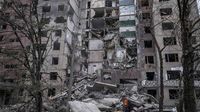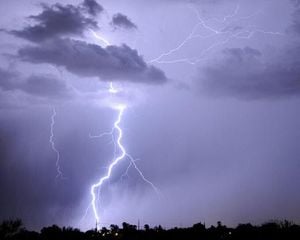In a tense atmosphere marked by ongoing conflict, Russian President Vladimir Putin announced a three-day ceasefire starting Wednesday, May 7, 2025, to coincide with the Victory Day commemorations. However, Ukraine dismissed the truce as mere propaganda, instead calling for a more substantial 30-day ceasefire. The Ukrainian government has expressed skepticism about Russia's commitment to peace, with President Volodymyr Zelensky stating, "We know who we are dealing with; we do not believe them." This sentiment reflects a broader concern that the ceasefire may not hold, as Ukraine accused Russia of continuing its attacks along the entire front line, reporting 734 violations and 63 attempted assaults since the ceasefire began.
Meanwhile, the European Commission unveiled a significant plan on May 6, 2025, aimed at ending European imports of Russian gas by the end of 2027. The proposal includes a ban on new contracts and short-term agreements with Russian companies by the end of 2025, followed by a complete halt to all gas imports two years later. This move underscores Europe's determination to reduce its dependence on Russian energy amidst the ongoing conflict.
On the military front, the Russian Ministry of Defense announced a prisoner exchange on the same day, with 205 Ukrainian soldiers traded for an equal number of Russian prisoners. This exchange occurred just ahead of the ceasefire and highlights the ongoing human cost of the conflict.
In another development, the Ukrainian parliament ratified a historic agreement with the United States on May 8, 2025, concerning the exploitation of natural resources. Minister of Economy Ioulia Svyrydenko expressed optimism that this agreement could pave the way for additional American military aid to help Ukraine repel the ongoing Russian invasion.
Despite the declared ceasefire, reports from Ukraine indicated that Russian forces were still launching guided bomb attacks. The Ukrainian Air Force reported these attacks occurred overnight, raising concerns about the sincerity of Russia's commitment to the truce. Ukrainian Foreign Minister Andrii Sybiga stated, "According to our military data, despite Putin's declarations, Russian forces continue to attack across the entire front line." He vowed that Ukraine would respond appropriately to any violations.
Conversely, the Russian military claimed to be adhering strictly to the ceasefire while asserting they would respond to any Ukrainian attacks. The Kremlin maintained that no airstrikes, missile strikes, or artillery fire would occur during the ceasefire period.
As the conflict continues, Lithuania's parliament took a notable step by approving the country's withdrawal from the international convention banning anti-personnel mines, citing security concerns amid the ongoing aggression from Russia. This decision reflects a broader trend among Baltic states to bolster their defense capabilities in light of the Russian threat.
During a meeting with Xi Jinping on May 8, 2025, Putin emphasized the mutually beneficial nature of Sino-Russian ties, asserting that their relationship is not aimed at opposing any third countries. Xi Jinping denounced what he termed "hegemonic harassment" against Russia, reaffirming China's commitment to stand alongside Moscow. This meeting comes as both leaders prepare for the Victory Day celebrations, where Chinese soldiers are expected to participate in the military parade on May 9, despite Ukrainian warnings that such involvement would be seen as support for Russian aggression.
The upcoming commemorations are particularly significant as they mark the 80th anniversary of the victory over Nazi Germany. Zelensky, reflecting on this milestone, stated that "the evil of Russia must be fought together," urging unity against the ongoing Russian invasion. He criticized the lavish celebrations planned by the Kremlin, labeling them a "parade of cynicism" and "lies."
In a related context, the United States has condemned Russia's actions at the United Nations, calling out its obstruction of sanctions against North Korea. U.S. Ambassador Dorothy Shea highlighted the need for member states to remain vigilant against violations that could support North Korea's illegal weapons programs.
Amidst these developments, Moscow is also grappling with the logistical fallout from the conflict. Since the commencement of drone attacks on Russian territory, at least 350 flights have been canceled or delayed, affecting around 60,000 passengers. This disruption comes as the Russian military claims to have intercepted numerous Ukrainian drones aimed at Moscow, indicating an escalation in aerial confrontations.
Looking ahead, J.D. Vance, the U.S. Vice President, called for direct negotiations between Ukraine and Russia, suggesting that such discussions are essential for achieving a resolution to the conflict. This stance reflects a growing sentiment among some U.S. officials that dialogue may be necessary to de-escalate tensions.
In a stark warning, Zelensky cautioned against travel to Moscow during the Victory Day celebrations, hinting at potential Ukrainian attacks during this time. This warning underscores the precarious situation as both sides prepare for what could be a pivotal moment in the ongoing conflict.
As the situation evolves, the international community watches closely, with many hoping for a resolution that can bring an end to the violence and suffering endured by both Ukrainians and Russians alike. The coming days will be crucial, as the world awaits the outcomes of the commemorations and the potential for renewed dialogue.




